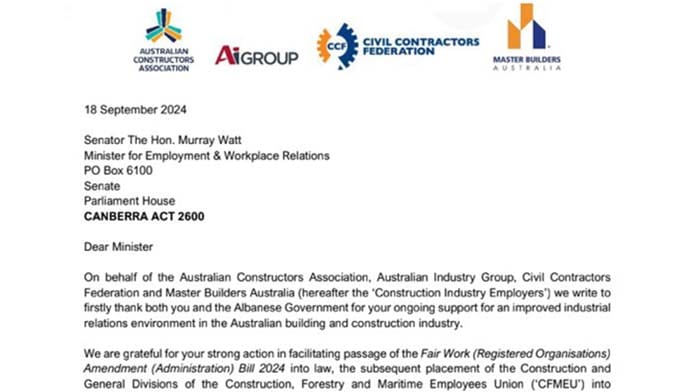A letter from four construction bosses’ organisations to Murray Watt, Minister for Employment, has blown open the real agenda behind the attack on the CFMEU.
The employers thank Labor for putting the construction division of the union into administration—but make it clear that they regard this as just the start.
Their real concern is not unproven allegations of criminality in the sector. The bosses are out to smash the “business as usual” approach to enterprise bargaining.
They call on the government to “decisively address the entrenched practice of pattern bargaining”. Pattern bargaining is when a union fights for identical conditions across a range of employers.
They want an attack on conditions by outlawing any union say over the “selection and use of contractors or mandate consultation about the use of such contractors”.
Remarkably, the bosses think the government-appointed administrator is too soft.
“As it stands, industry does not have confidence in the capacity of the implementation of the administration alone to address the entrenched problems connected to the operating of bargaining in the sector.
“A further regulatory response is required urgently.”
The 16-page letter, obtained by Solidarity, is signed by the CEOs of the Australian Constructors Association, the Civil Contractors Federation, the Australian Industry Group and the Master Builders Australia.
It is dated 18 September, the day after the Master Builders Association Victoria wrote to the Building Industry Group of unions (BIG) in Victoria saying they would honour the latest EBA.
Construction unions had planned to march tens of thousands of their striking members to the MBA’s offices in East Melbourne but changed the route after receiving the letter.
However, in the letter to Watt the industry groups criticise the administrator, Mark Irving, for trying to maintain the full EBA process, saying the union has been “disgraceful” in its dealing with builders and that the “administrator’s proposed course risks repeating the mistakes of the past”.
Five clauses
The builders’ lobby groups rail against five EBA clauses, which they say are union forms of “control” over builders, including the union being present at new worker inductions onsite.
They want the government to prohibit the Fair Work Commission (FWC) from including any of the five clauses they object to in EBAs, and to make it illegal for any official or worker “to take action” to “pressure” builders to include any one of these five clauses.
Not surprisingly, one of the clauses the bosses object to is the one that requires all subcontractors to be “engaged on terms no less favourable than the terms of the Head Contractor (commonly known as ‘jump-up’ clauses)”.
The four employer groups make it clear that it’s their profits that must come first, whinging that “these clauses are a handbrake on the capacity of the industry to drive productivity”.
The bosses want Labor to outlaw the union using its strength to “coerce or force employers to sign agreements”.
The five clauses are the first part of EBAs that builders want to fight over. They will not be the last.
They want stronger laws to shackle the unions. Construction company CPB recently used the FWC against workers at Brisbane’s Cross River Rail, with the commission ruling that CFMEU organisers meeting with workers during their breaks could constitute unprotected industrial action.
72-hour strike
Troy Gray, Victorian secretary of the Electrical Trades Union, named the major builders Laing O’Rourke, John Holland and Acciona as companies which were trying to “wind back the clock decades” with the CFMEU now under administration.
Gray threatened a 72-hour strike by BIG unions if the builders refused to implement the latest CFMEU EBA. This part of his speech got the loudest cheer at the end of the construction protest rally in Melbourne on 19 September.
The idea of a three-day strike has wide support on building sites in Melbourne and Sydney, where workers want a hammer-blow against administration and the bosses given the serious nature of the attack on the CFMEU.
The ACT Branch of the CFMEU held a two-day delegates’ conference in late September and that branch also wants another protest strike day, but it is yet to be determined.
The bosses’ organisations’ duplicity in their letter to Minister Watt will further fuel union outrage and increase the pressure for a 72-hour strike.
Rank-and-file activists in the construction unions will have to push to make it a reality. This is the way for construction workers to fight Labor’s administration.
By Tom Orsag






